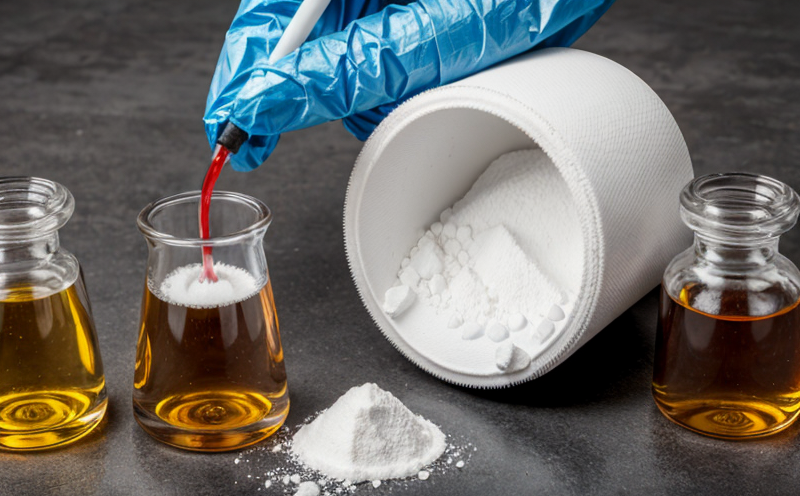IEC 62821 Compliance Testing for Phthalates in Materials
The International Electrotechnical Commission (IEC) publication IEC 62821 provides a harmonized approach to the testing and evaluation of phthalate content in materials intended for use in electrical and electronic equipment. This service is crucial for manufacturers, quality managers, compliance officers, and R&D engineers seeking to ensure that their products meet stringent international standards and regulatory requirements.
The primary objective of IEC 62821 is to mitigate the risks associated with phthalates, which are plasticizers widely used in the production of various consumer goods. Excessive exposure to certain phthalates can be harmful to human health and the environment. Therefore, compliance testing ensures that products comply with regulations such as REACH (European Union Regulation) and TSCA (United States Toxic Substances Control Act).
The testing process involves multiple stages, including sample preparation, extraction of phthalates using solvents like dichloromethane, and subsequent analysis via chromatographic techniques. The service provider utilizes state-of-the-art instrumentation such as High-Performance Liquid Chromatography (HPLC) and Gas Chromatography-Mass Spectrometry (GC-MS) to achieve precise and accurate results.
Testing samples for phthalates is not a one-size-fits-all process. Depending on the material type, size, and intended use, different extraction methods may be required. For instance, rigid plastics might require mechanical grinding followed by solvent extraction, while flexible materials could necessitate ultrasonic bath or reflux techniques.
The laboratory adheres to strict quality control protocols throughout each stage of testing. This includes maintaining consistent environmental conditions, calibrating instruments regularly, and employing skilled analysts trained in the latest methodologies. By doing so, we ensure that our clients receive accurate, reliable results they can trust when making decisions about their product offerings.
Compliance with IEC 62821 is essential not only for avoiding potential legal penalties but also for maintaining brand reputation and customer confidence. In today's competitive market where sustainability is increasingly becoming a priority among consumers, adherence to these standards can set your business apart from competitors who do not meet such stringent criteria.
Our team of experts will guide you through the entire testing process—from initial consultation to final report delivery—ensuring that every step is carried out according to best practices and international guidelines. With our comprehensive understanding of both technical aspects and regulatory requirements, we are committed to helping businesses navigate this complex landscape successfully.
Why It Matters
Phthalates have been linked to various adverse health effects including reproductive issues, developmental disorders, and increased risk of certain cancers. Due to these concerns, many governments around the world have implemented regulations aimed at reducing or eliminating phthalates from consumer products.
- REACH Regulation: Requires manufacturers placing chemical substances on the EU market to demonstrate that they meet stringent safety criteria.
- TSCA: Mandates testing and evaluation of chemicals used in manufacturing processes within the United States.
- JIS: Japanese Industrial Standards specify requirements for product quality, safety, and environmental protection.
The implementation of these regulations has led to increased demand for reliable phthalate testing services. By offering IEC 62821 compliance testing, our laboratory supports businesses in ensuring their products meet regulatory standards, thereby protecting public health and the environment while fostering trust among customers.
Furthermore, companies that comply with such stringent requirements often gain competitive advantages by demonstrating a commitment to sustainability and responsible manufacturing practices. This can enhance brand reputation and open up new market opportunities.
International Acceptance and Recognition
- IEC 62821: Widely accepted in Europe, Asia-Pacific region, and North America for assessing phthalate content in plastic materials used in electrical and electronic equipment.
- ISO/TS 16949: International technical specification applicable globally for the automotive industry; IEC 62821 can be integrated into compliance checks under this framework.
- ASTM D792: American Society for Testing and Materials standard used primarily in North America for determining plastic hardness, which influences how phthalates behave during processing.
The harmonization provided by IEC 62821 ensures consistency across different regions, making it easier for manufacturers to meet multiple regulatory requirements simultaneously. Our laboratory’s expertise in conducting this test according to international standards guarantees that your results will be recognized and accepted worldwide.
Environmental and Sustainability Contributions
Compliance with IEC 62821 goes beyond mere adherence to legal mandates; it plays a vital role in promoting environmental sustainability. By reducing the presence of harmful phthalates in consumer products, businesses contribute positively towards minimizing pollution and safeguarding natural resources.
The use of sustainable materials and manufacturing processes is becoming increasingly important across industries. IEC 62821 supports this trend by encouraging innovation aimed at developing safer alternatives to traditional plasticizers while maintaining product performance standards.
Moreover, companies that prioritize environmental responsibility are likely to experience long-term benefits such as reduced operational costs due to decreased waste generation and improved efficiency in resource utilization. These advantages align well with broader corporate social responsibility goals.





